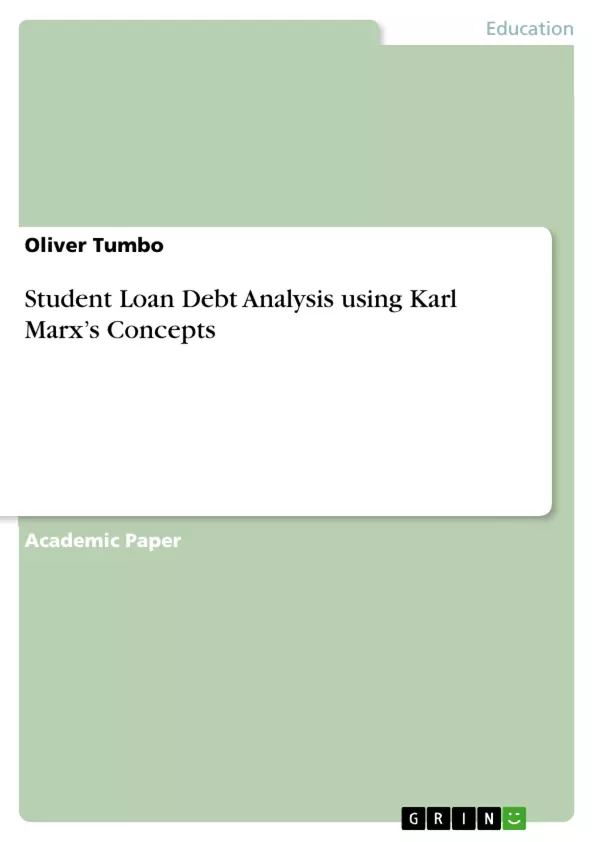Karl Marx's concepts revolve around bridging the rift between the well-to-do in society and the have-nots, thus offering a comprehensive analysis of the difference in social classes. Education empowerment in society can bridge this gap although gradually. Education is a basic necessity, but its cost is skyrocketing towards a level when it becomes a luxury. University education is increasingly becoming too expensive for the average American student. As a result, one can only wonder about the worth of a society where its youth have sunk deep into debts with extraordinary interest rates. Karl Marx's theories aid in comprehending the effects of student loans on social debt and find a way of bridging a gap between the various social classes.
Inhaltsverzeichnis (Table of Contents)
- Student Loan Debt Analysis Using Karl Marx's Concepts
- Capitalism and Student Loan Debt
- The Impact of Student Loans on Social Debt
- Government Policies and the Student Loan System
- Marx's Ideologies and Student Loan Debt
Zielsetzung und Themenschwerpunkte (Objectives and Key Themes)
This paper analyzes the current student loan debt situation in the United States through the lens of Karl Marx's theories, highlighting the role of capitalism and government policies in perpetuating social debt. It aims to demonstrate the negative impacts of student loans on social equity and explore potential solutions for a more sustainable system.
- The role of capitalism in perpetuating social debt through student loans
- The impact of increasing tuition costs on student debt levels
- The government's role in creating and profiting from the student loan system
- The connection between student loan debt and social inequality
- Potential solutions for reducing student loan debt and promoting social equity
Zusammenfassung der Kapitel (Chapter Summaries)
- The introduction introduces the concept of student loan debt and its relationship to social inequality. It argues that Karl Marx's theories can provide valuable insights into understanding the current situation.
- This chapter delves into the relationship between capitalism and student loan debt, highlighting how increasing tuition costs and government policies contribute to the problem.
- This chapter examines the impact of student loans on social debt, analyzing how they can lead to unsustainable levels of debt and exacerbate social inequality.
- This chapter discusses the role of government policies in shaping the student loan system and argues that the current system is designed to benefit the government rather than students.
- This chapter explores the relevance of Marx's ideologies in understanding the current student loan debt situation and suggests potential solutions for a more equitable and sustainable system.
Schlüsselwörter (Keywords)
The central keywords and topics of this work include student loan debt, social debt, capitalism, government policies, social inequality, Karl Marx, education, and sustainable debt burden.
Frequently Asked Questions
How does Karl Marx’s theory relate to student loan debt?
Marx’s concepts are used to analyze the rift between social classes (haves and have-nots) and how student debt perpetuates social inequality in a capitalist system.
Is university education becoming a luxury in the US?
The paper argues that skyrocketing tuition costs are pushing university education toward becoming a luxury rather than a basic necessity for average students.
What role does the government play in the student loan system?
The analysis suggests that government policies often benefit the state financially rather than the students, contributing to unsustainable levels of social debt.
What is the impact of student loans on social equity?
High interest rates and deep debt among youth increase the gap between social classes, hindering the empowering potential of education.
What solutions are explored in the paper?
The work explores potential solutions for a more sustainable debt burden and ways to bridge the gap between various social classes through policy reform.
- Arbeit zitieren
- Oliver Tumbo (Autor:in), 2020, Student Loan Debt Analysis using Karl Marx’s Concepts, München, GRIN Verlag, https://www.grin.com/document/966976



